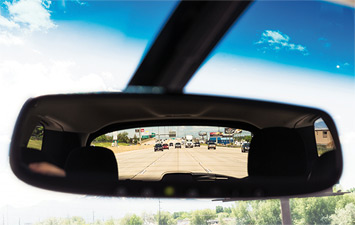Funding in the Rearview Mirror: Tracking Impact over Time

By Ellen Hallsworth, Senior Manager of Research & Grants at the Peterson Center on Healthcare
This article first appeared in Donaghue’s Soapbox blog.
2020 has demonstrated no shortage of new problems coming down the road. Covid-19, health disparities, economic uncertainty and educational disarray have placed huge demands on philanthropic funding and attention. As we devise new strategies and programs to meet the challenges of a fraught and uncertain road ahead, we are often left with little time to look in the rearview mirror to understand the impact of previous funding.
The problem of ‘projectism’ in philanthropy is well-established. Too often, funders fund discrete projects, establish them with excitement, manage the budget and relationship, and then consign them to history. For projects that span several years, changes in strategy and staffing can compound a temptation to move on to shinier, newer objects. Incentive structures in academia mirror and entrench these tendencies.
In the past, the relationship between funders and grantholders has often been transactional: funders had the money and wrote the checks; grantholders had the worthwhile causes, the skills and knowledge. Recently, philanthropy has come to see its role in terms of investing in long-term change. Philanthropic funders have more expertise than before; we are no longer purchasers, but fellow travelers.
Yet where philanthropy has succeeded in sparking lasting change it has rarely been the product of a single project. Change has required concerted efforts on several fronts, often over decades. As a research project, or intervention ends we may be 5-10 years, at best, from seeing a substantive impact on policy, clinical practice, or patient outcomes. Where funders have created programs to fund impact specifically, uptake has frequently been limited.
How can we, as funders, create structures and processes that prompt us to look in the rearview mirror? Here are some suggestions:
- Anniversary check-ins. We could end grants with an expectation that we will check in at intervals; even on anniversaries. As part of this process, we could agree on metrics to track over time, which could enable us to better understand how a project’s impact plays out over time. Funders often feel a degree of reluctance to get in touch with former partners, hesitating in case an email opens up a difficult conversation about future funding. By making checking in a routine part of ending a project (and by funding this where necessary) some of this awkwardness would be removed, facilitating a clearer focus on understanding impact.
- Curate the ‘back catalog’. We could shift the role of program officers to include an element of proactively managing and curating a ‘back catalog’ of previous projects, in addition to developing and managing new ones. At present, there is a tendency for old grants to be ‘orphaned,’ with few reasons to engage with them after they end. By altering incentive structures and job descriptions, philanthropy could create more space for stewardship of a whole program.
- Build teams for impact. We could set up projects up for success by thinking about project teams that will focus not just on research, but also on continued engagement, impact and learning. Those who produce research and design new interventions are not always the same as the people with the networks, relationship skills and tenacity to embed the impact of a project over time. Constructing teams with a range of skills can help to build-in a focus on impact.
George Santayana famously wrote that “those who cannot remember the past are condemned to repeat it.” For philanthropic funders, watching the dust settle on the road behind us may be a useful way to ensure that we navigate forwards and not in circles.